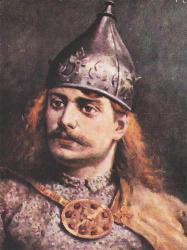Prominent Poles
Boleslaw III Krzywousty (Boleslaus III the Wry-mouthed) Prince of Poland, 1102-1138.

Born: August 20, 1086 , Plock (?)
Died: October 28, 1138, Sochaczew (?)
AUTHOR'S WARNING! Boleslaw Wry-mouthed was undoubtedly a cruel man (as were other European rulers of that time). However information submitted below regarding alleged massacres of Pomeranians by his soldiers are not confirmed- they may be true or they may be not.
Early days. He was the son of Wladyslaw I Herman, Prince of Poland and Judith of Bohemia, daughter of Vratislav II of Bohemia. At that time Sieciech, a Polish magnate, was believed to be the de Facto ruler of Poland. He was count palatine at the court of Prince WladyslawI Herman. In 1099 the disgruntled nobles sought to limit his influence by proposing that the country should be divided between Wladyslaw I Herman and his sons Zbigniew and Boleslaw. Their wishes were granted when in circa 1100 Sieciech was stripped of his land and titles by Wladyslaw I Herman and banished from the country. According to Gallus Anonymus Sieciech managed to return to Poland before his death.
Poland's Ruler. After the death of Wladyslaw I Herman in 1102 Poland was ultimately divided: Zbigniew received Wielkopolska and Mazowsze and Boleslaw Malopolska and Slask (Silesia). In 1106-1107 Boleslaw Wry-mouthed captured Zbigniew's domain and became Poland's ruler with Zbigniew retaining Mazowsze. In 1108 Boleslaw attacked Zbigniew again. Zbigniew turned for help to the emperor Henry V who then attacked Poland. In 1109 Boleslaw defeated the emperor's troups at the battles of Glogow and Psie Pole (the latter also known as the Battle of Hundsfeld). As the result Zbigniew was banished from Poland. In 1109 Boleslaw defeated the Pomeranians at Naklo. The Pomeranian Duke Swietopelk became Boleslaw's vassal. In 1110 Boleslaw pledged allegiance to the emperor Henry V. In 1112 Zbigniew was allowed to return to Poland. Upon his return he was accused of planning murder of Boleslaw who ordered blinding Zbigniew. Zbigniew died soon thereafter. This action caused Archbishop Marcin to impose an interdict on Boleslaw. He did penance by pilgrimage to Hungary and to the grave of St.Wojciech (St.Adalbert) in Gniezno. The indertict was removed. In 1115 a several years old Polish-Czech conflict ended. In 1116 Boleslaw conquered Pomorze Gdanskie (Gdansk Pomerania). A year later took place a rebellion of the magnates under the palatin Skarbimir Awdaniec. Skarbimir was caught, blinded and his tongue was cut out. His family was persecuted. This time no interdict was imposed on Boleslaw. In 1118 Piotr Wlostowic kidnapped Prince Wolodar of Przemysl. He was forced to break the alliance with Pomerania and to make an eternal peace with Poland. Boleslaw appointed Wlostowic a palatine. In 1119 Boleslaw definitely conquered Pomorze Gdanskie and in 1122 Pomorze Zachodnie with Szczecin. According to one unconfirmed source Boleslaw was guilty of a massacre committed on Pomeranians, a West Slavic tribe. Boleslaw "is said to have put 18000 people to death, and to have additionally transported to Poland another 8000 people together with their wives and children." Boleslaw ceased his tribute to the emperor Henry V upon his death in 1125.
In 1130 in alliance with the Danish prince Magnus I of Gothenland, Boleslaw threatened Rugia. Polish forces helped by Danish fleet compelled Ranis (a West Slavic tribe settled in Rugia) to recognize Boleslaw's rule over the island, but ultimately failed to accomplish that goal. In 1135, Boleslaw finally gave his belated oath of allegiance to the new Emperor Lothair II (Lothar von Supplinburg), and paid twelve years past due tribute. The emperor granted Boleslaw parts of Western Pomerania and Rugia as fiefs, however the emperor was not in control of these areas and Boleslaw also failed to subdue them. Boleslaw also campaigned in Hungary 1132-1135, but to little effect. In 1135 he was forced by the Emperor to make peace with Hungary. Before his death in 1138, Boleslaw published his testament (Boleslaw Wry-mouth's testament) dividing his lands among four of his sons. The "senioral principle" established in the testament stated that at all times the eldest member of the dynasty was to have supreme power over the rest and was also to control an indivisible "senioral part": a vast strip of land running north-south down the middle of Poland, with Krak�w its chief city. The Senior's prerogatives also included control over Pomerania, a fief of the Holy Roman Empire. The "senioral principle" was soon broken, leading to a period of nearly 200 years of Poland's feudal fragmentation. Boleslaw Krzywousty was buried in the Plock cathedral.
Marriages and children. In 1103 Boleslaw III married, Zbyslava, daughter of Grand Duke Sviatopolk II of Kiev. They had one son Wladyslaw II Wygnaniec of Silesia, Prince of Poland 1138-46. Boleslaw subsequently married in 1115 Salome von Berg-Schelklingen, daughter of Count Heinrich von Berg. They had 14 children (six sons and eight daughters), of whom six sons and five daughters are known: Leszek; Kazimierz Starszy; Boleslaw IV Kedzierzawy (Boleslaus the Curly) of Mazowsze, Prince of Poland 1146-1173; Mieszko III Stary (Mieszko III the Old) of Wielkopolska, Prince of Poland 1173-1177 and 1194-1202; Henryk of Sandomierz ; Kazimierz II Sprawiedliwy (Casimir II the Just) of Sandomierz, Prince of Poland 1177-1194; Rikissa of Poland who married in turn Magnus the Strong, King of Denmark, Vladimir, Prince of Novgorod and Sverker I King of Sweden; Dobronega of Poland, who married Marquis Dietrich of Niederlausitz; Gertruda of Poland; Judith of Poland, who married Otto I Margrave of Brandenburg; and Agnieszka of Poland, who married Grand Prince (Velikiy Knaz�) Mstislav II of Kiev.
This article uses, among others, material from the Wikipedia article "Boleslaus III Wrymouth" licensed under the GNU Free Documentation License. :
Wikipedia
and other sources
Zgapa (in Polish)
Sciaga (in Polish)
Poczet Wladcow (in Polish)
Piastowie (in Polish)
Return to home page:
Prominent Poles
